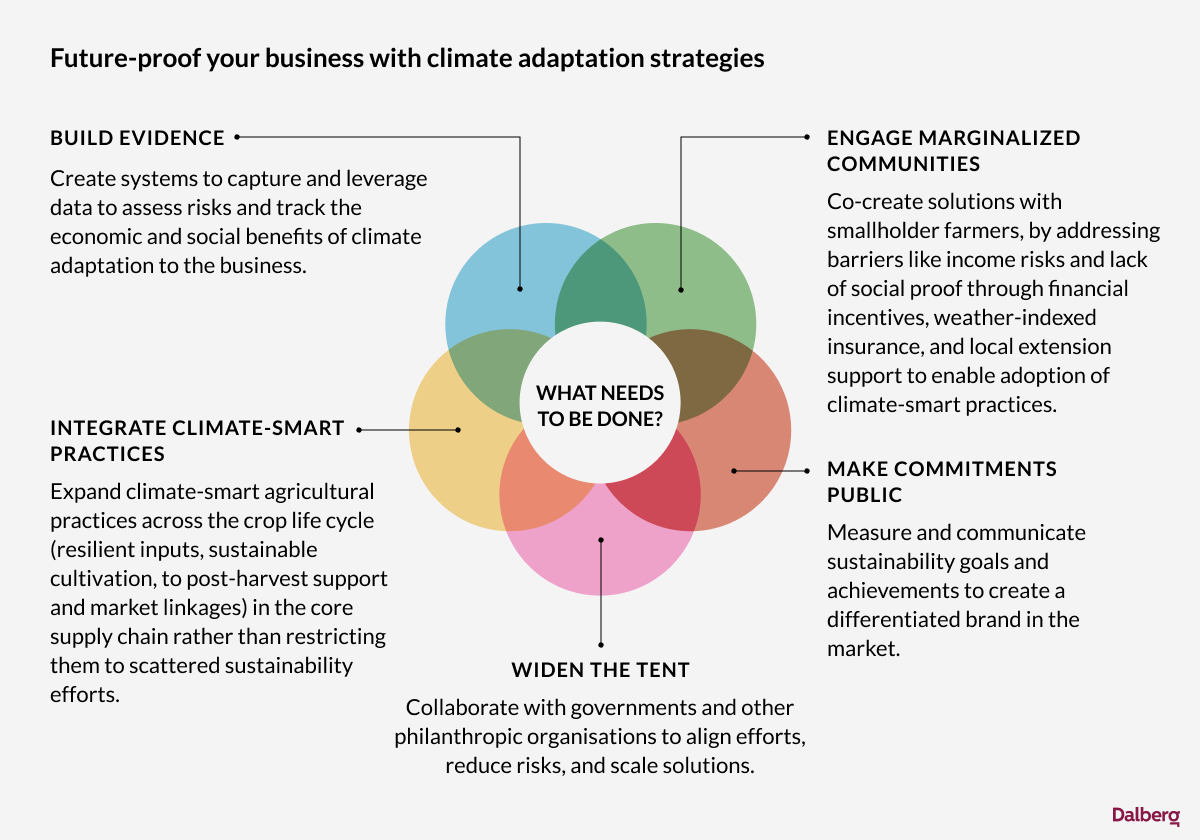Dalberg uses cookies and related technologies to improve the way the site functions. A cookie is a text file that is stored on your device. We use these text files for functionality such as to analyze our traffic or to personalize content. You can easily control how we use cookies on your device by adjusting the settings below, and you may also change those settings at any time by visiting our privacy policy page.
Climate change is no longer a distant challenge—it’s a pressing reality, especially for agriculture. Erratic rainfall, prolonged droughts, and extreme weather events disrupt farmer incomes, destabilize agricultural supply chains, and threaten the sustainability of businesses reliant on these inputs. Beyond mitigation efforts like reducing emissions or conserving water, true sustainability demands climate adaptation. This involves adjusting practices, processes, and systems to minimize harm, build resilience, and enhance the capacity of farming communities to withstand and recover from climate impacts.
For businesses dependent on agricultural supply chains, these challenges are especially critical. Declining crop yields not only reduce raw material availability but also drive price volatility, increase operational costs, and risk long-term supply chain stability. Without supporting farmers and addressing issues like poverty and climate vulnerability, businesses expose themselves to significant risks while undermining the foundation of sustainable agriculture.
Why Aren’t Agricultural Businesses Doing More?
Despite clear risks, the agricultural sector has been slow to adopt climate adaptation measures. While global players in the EU and Switzerland align with stringent mandates, businesses in emerging economies like India remain behind. While private sector companies are developing sustainability programs given the Environmental, Social, Governance (ESG) mandates and momentum, the focus on “E” remains primarily on mitigation. Several factors contribute to this inertia, as highlighted in a study conducted by Dalberg, which examined over 70 businesses operating in India, including global companies:
- Lack of Risk Assessment Tools: Many companies lack internal capabilities to assess climate risks, and external assessments are often expensive.
- Uncertain Path to Scale: Scaling pilot programs in optimal ways or forming partnerships with civil society and government organizations remains complex and underexplored.
- Difficulty Measuring ROI: Quantifying resilience outcomes or identifying clear business benefits from adaptation efforts is challenging.
- Shared Benefits Challenge: Companies operating in similar geographies struggle to collaborate and share outcomes, such as carbon credits.
The Consequences of Inaction
Failure to address climate adaptation can be catastrophic for agricultural businesses and the communities they depend on. For example, a major sugarcane producer in Tamil Nadu had to shut its operations for two years due to consecutive droughts and depleted groundwater. In Assam, tea yields are projected to decline by 40% by 2050 due to rising temperatures and changing rainfall patterns.
Smallholder farmers, who make up 85% of India’s agricultural workforce, are among the most vulnerable. With limited financial resources or technical know-how, they are ill-equipped to withstand climate shocks. Ignoring their challenges undermines the stability of global supply chains, risking their livelihoods and long-term business viability.
What Needs to Be Done?
To future-proof their operations, agriculture-dependent businesses must integrate climate adaptation into their core strategies. The visual below shows five proposed steps they need to take towards building a resilient future for themselves and the communities that are part of their supply chain.

A good case study to illustrate the approach above is ITC, one of India’s largest FMCG companies which has supported over a million farmers through its “climate-smart villages.”

Mainstream Future-Proofing
The private sector must shift its sustainability focus from mitigation to adaptation. This requires integrating climate-smart practices into agricultural supply chains, fostering partnerships with philanthropic organizations, and aligning business strategies with community resilience goals.
Companies like ITC, HUL, Diageo, Mondelez, and Mars are making strides in sustainability, but the agricultural sector needs to scale its adaptation efforts to ensure systemic resilience. By future-proofing supply chains and empowering vulnerable farming communities, businesses can mitigate risks and unlock opportunities for long-term growth.
Climate change is no longer an abstract concern. It is already reshaping the agricultural landscape. Businesses must recognize the interconnectedness of their operations with the livelihoods of farmers. Investing in climate adaptation is not just a moral responsibility; it is a strategic necessity for long-term sustainability. The time to act is now. The private sector is poised to take action given their resources, ability to make quick decisions, and capacity to leverage learnings from their global networks. They must lead the way in building a more resilient future.
Reach out to Shruti to learn more about Dalberg’s initiatives in climate mitigation:


